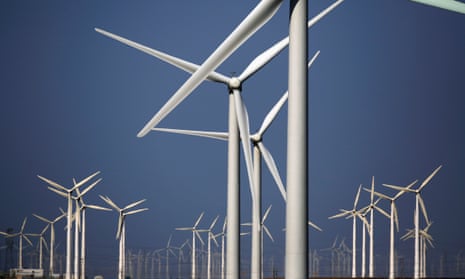Investment in renewable energy has dropped by 70% as Australia loses green business overseas, a report by the Climate Council has found.
“Investment that could be coming to Australia is instead going overseas to countries that are moving to a renewables energy future,” the report’s co-author, Tim Flannery, said.
Flannery said over the past year investment in Australian renewable energy projects had dropped 70%, while China installed more renewable energy capacity than fossil fuels in 2013.
The Coalition government is awaiting the results of a second review into the Renewable Energy Target, with the renewables industry blaming uncertainty over its future for the investment drought.
The report, Lagging Behind: Australia and the Global Response to Climate Change, found China had retired 77 gigawatts of coal power stations between 2006 and 2010 and aimed to retire a further 20GW by next year.
“The US is also rapidly exploiting the global shift to renewable energy, coming second only to China for installed renewable energy due to a range of state based renewable energy targets, incentives and initiatives,” Flannery said.
Renewable energy generation in the US was 12.9% of the total energy mix in 2013, which the report said put the US on track to meet its international commitment to reduce emissions by 17% below 2005 levels by 2020.
“The global energy transition from fossil fuels to renewable energy is now well under way,” Flannery said.
Australia has come under pressure to cut its carbon emissions deeper after the European Union last week agreed on a new target of 40% by 2030.
The agreement, labelled by the EU as a new global standard, also includes a 27% target for renewable energy by 2030.
The Coalition government has said it will consider a new post-2020 target in early 2015 before the United Nations conference in Paris where a new commitment will be discussed.
The government also come under pressure from Europe, the United Nations, scientists and the environment movement to ensure this weekend’s G20 leaders’ summit in Brisbane makes a clear statement on climate action.




Comments (…)
Sign in or create your Guardian account to join the discussion